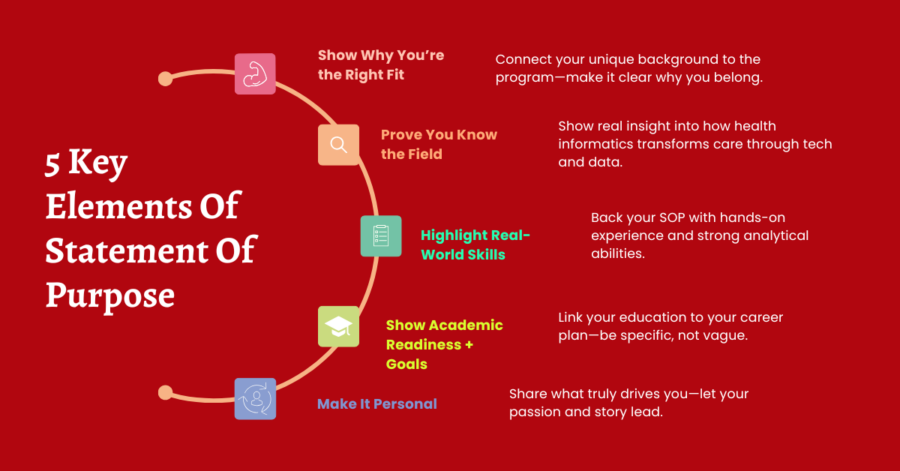2 May 2025
6 minutes read
How To Write A Perfect Statement Of Purpose For Masters In Health Informatics Program?

Key Takeaways
- Write a statement of purpose for masters in health informatics that connects your real experience with what the program offers
- Show clear understanding of healthcare data, systems, and how informatics improves patient outcomes
- Highlight practical skills with analytics, EHRs, or public health work to prove real-world readiness
You’re about to write your statement of purpose for a Master’s in Health Informatics, and it’s time to make it count. This isn’t just another academic exercise—it’s your chance to showcase your background in healthcare, information technology, or analytics, and prove you’re ready for a degree in health informatics. Whether you’re an intern with hands-on experience in clinical informatics or an undergraduate with a passion for healthcare information, the admissions committee wants to see how your skills with Python and electronic health systems will shape the future of patient care.
Don’t just tell them you want to be a health informatics specialist; show them you understand the healthcare industry need for excellence and innovation in the field.
What Are The Key Elements To Write A Great Statement Of Purpose?
Admissions committees sift through hundreds of these things, so when they read yours, they’re thinking: “Is this worth my time?” The issue? Most applicants either spew boring fluff or overcomplicate things. Here’s the truth: your statement shouldn’t just list achievements—it should tell a story that hooks them and says, “This person won’t just pass the healthcare informatics program, they’ll crush it.”

Let’s break down the key elements to make sure you stand out.
1. Start with Why You’re a Perfect Fit, Not Just Why You Want the Degree
A generic “I’ve always been passionate about healthcare” won’t cut it. You need to connect your unique background with the curriculum, showing how your previous work as an analyst or your deep dive into health information makes you ideal for the healthcare informatics program. Highlight your experience in public health or pharmacy, and explain how it shapes your desire to enhance healthcare systems through data and technology.
2. Demonstrate a Clear Understanding of the Field of Health Informatics
Don’t just say you want to become a health informatics specialist—show them you understand what the field actually entails. Talk about your insights into how healthcare informatics integrates data with technology to improve patient care. Whether it’s your experience with electronic health records or your work in public health, demonstrate how you plan to contribute to the rapidly evolving healthcare landscape.
3. Highlight Practical Experience and Analytical Skills
Admissions committees love candidates who bring practical experience to the table. Did you work as an analyst, studying the trends in pharmacy data or analyzing patient care metrics? That hands-on experience is gold. Show them how your skills can be directly applied to solve real-world healthcare problems. Tie your knowledge of analytics to the specific areas of healthcare informatics that will make an impact.
4. Show a Strong Academic Foundation with Clear Career Goals
Your statement of purpose needs to demonstrate that you have the academic foundation to thrive in the program. Whether you have a background in pharmacy, public health, or another related field, make it clear how your prior education prepared you for the challenges of the healthcare informatics curriculum. Then, don’t just stop at “I want to help patients” – lay out specific career goals that show your trajectory toward becoming a healthcare analyst or informatics specialist.
5. Personalize Your Story—What Drives You to Excel in Healthcare Informatics
This is where you get to be human. Admissions committees aren’t looking for a robotic recitation of facts; they want to know what drives you to excel in this field. What personal experience sparked your interest in healthcare information or public health? Whether it was seeing the inefficiencies in the pharmacy system or your exposure to the data side of healthcare, your story should connect your passion with the practical applications of health informatics.
10 Top Universities For Masters In Health Informatics For Indian Students
You’ve got to look at the curriculum, the internship opportunities, and—let’s be honest—how much you’ll be bleeding from your bank account. You’re here to learn about how Health Information Technology (HIT) will impact the U.S. healthcare system, electronic health records, and the role of health informatics specialists, but also how those years of work experience or research will translate into a lucrative salary.

So, here’s a quick rundown of top universities where you can earn a Master of Science (MS) in Health Informatics in USA and what that degree might get you in terms of cost and career opportunities.
| University | Average Tuition Fees (per year) | Average Salary After Graduation | Special Features |
|---|---|---|---|
| University of California, Berkeley | $40,000 | $95,000 | Focus on electronic medical data, analytics |
| University of Illinois | $30,000 | $90,000 | Interdisciplinary curriculum, STEM designated |
| University of Texas | $35,000 | $92,000 | Specialization in population health management |
| Johns Hopkins University | $50,000 | $100,000 | Top-tier health informatics research and clinical analysis |
| University of Michigan | $45,000 | $98,000 | Focus on data science, patient information systems |
| University of Washington | $42,000 | $97,000 | Great work experience opportunities with healthcare providers |
| Northeastern University | $32,000 | $85,000 | Strong analytical focus, academic excellence |
| Boston University | $38,000 | $92,000 | Focus on healthcare delivery and medical data systems |
| University of Maryland, Baltimore | $36,000 | $90,000 | Robust concentration in health information technology |
| Carnegie Mellon University | $46,000 | $110,000 | Renowned for informatics research and data collection |
4 Amazing Tips To Get Into Top Universities For Healthcare Information Technology
These schools aren’t handing out admissions like candy—they’re looking for candidates who not only understand the U.S. healthcare system but also the intersection of data, technology, and patient care. Getting into these programs takes more than perfect grades; it takes strategy, smarts, and knowing exactly what to showcase on your application.
Let’s dive into five tips that’ll help you stand out and actually make your way into the program of your dreams.
1. Demonstrate Your Real-World Work Experience
It’s one thing to talk about health information technology in a classroom; it’s another to prove you’ve been in the trenches. Admissions teams want to see real-world experience—internships, work in healthcare delivery, or research projects in data science and clinical analysis. If you’ve worked with patient data, or even better, have experience in managing electronic medical systems, make sure you highlight that. The more practical experience you can show, the stronger your application becomes.
2. Nail Your Statement of Purpose with Specifics
Forget the generic “I’ve always been passionate about healthcare” line. Your statement of purpose needs to be specific, with clear links to your background, your understanding of healthcare informatics, and your vision for the field. Mention things like your exposure to information systems, analytical tools, or your fascination with how healthcare providers use data to make decisions. Admissions want to see why this field excites you, but more importantly, how your background positions you to succeed.
3. Make Your Academic Excellence Shine in the Right Areas
Sure, a solid GPA helps, but what admissions are really looking for is evidence that you’ve mastered the relevant areas. That could mean advanced courses in mathematics, biomedical sciences, or data analytics. Highlight your academic success in courses that connect directly to HIT—think population health management, healthcare delivery, or health information technology. Even a strong foundation in statistics can help your case. Tailor your academic portfolio to show you’ve already begun to build the skills necessary for a Master’s in HIT.
4. Leverage Your Analytical and Problem-Solving Skills
Healthcare information technology is all about solving complex problems with data. It’s not just about knowing the technology, it’s about understanding how to use it to make better decisions. Show that you’ve got the analytical chops to back up your desire to work in this field. Highlight any relevant experience with data collection, system analysis, or even research projects that involved real-world problem-solving. Admissions will be looking for students who can analyze and interpret complex medical data—not just memorize facts.
Conclusion
When it comes to applying for a Master’s in Health Informatics, it’s clear that standing out requires more than just academic credentials. It’s about blending your passion for healthcare with a strong grasp of technology and real-world experience. The field of health informatics is dynamic, and universities are looking for candidates who understand both its challenges and its potential. Be genuine, be specific, and most importantly, make sure your story reflects a clear purpose: why you belong in this field and how you’ll make an impact.
Most applicants struggle to write a perfect statement of purpose but end up sounding arrogant — but you won’t. At Ambitio, our AI-powered study abroad experts help you craft a powerful, standout statement of purpose that gets noticed. No fluff, no clichés—just a compelling story that proves you belong. Schedule a call with Ambitio’s experts.
FAQs
What is a good statement of purpose (SOP) for a master’s in health informatics?
A statement of purpose for a master’s in health informatics is a written document where applicants explain their motivation, background, career goals, and reasons for choosing the program to convince the admissions committee they are a good fit
How should I start my SOP for health informatics?
Begin with a compelling hook or quote related to health informatics, followed by your motivation for entering the field, your long-term goals, and unique personal attributes that make you suited for the program
How can I show that I am a good fit for the health informatics program?
Highlight your relevant skills, past projects or research, and explain how your goals align with the university’s mission and faculty research. Use the institution’s language and mention specific courses or professors that interest you
What are some common career goals to mention in the SOP for health informatics?
Short-term goals often include securing an entry-level job in health informatics, while long-term goals may focus on advancing to senior specialist roles or contributing to healthcare data management and research for societal benefit
Should I mention my previous work experience in the SOP?
Yes, detailing relevant healthcare or IT experience, such as working with electronic health records or clinical data systems, strengthens your SOP by demonstrating practical knowledge and readiness for graduate study
How important is it to tailor the SOP to the specific university?
Very important. Tailoring your SOP to reflect the university’s vision, mission, and specific program strengths shows genuine interest and cultural fit, which can improve your chances of admission
Can I include my future research interests in the SOP?
Yes! In fact, I would highly recommend doing it. Mentioning potential research topics or advisors you want to work with shows you have done your homework and have clear academic and professional objectives aligned with the program

You can study at top universities worldwide!
Get expert tips and tricks to get into top universities with a free expert session.
Book Your Free 30-Minute Session Now! Book a call now




























